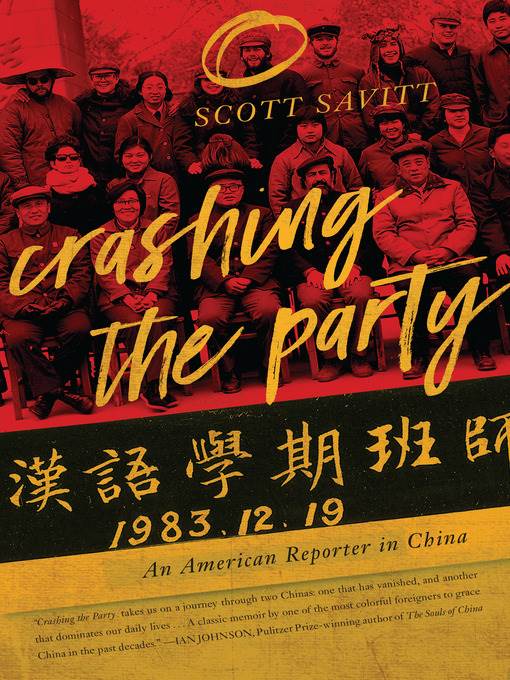
Crashing the Party
An American Reporter in China
کتاب های مرتبط
- اطلاعات
- نقد و بررسی
- دیدگاه کاربران
نقد و بررسی

September 12, 2016
In this page-turning debut, Savitt, the New York Times’s in-house Chinese-English translator, relates his experiences in China. He begins his story in 1982, when he was a first-year Duke student; grief stricken after his girlfriend’s death, he decided to go on a study abroad trip to the country. Returning after graduation to pursue his journalistic dreams, Savitt finds himself in the midst of historic news stories. The book vividly describes his 17 years of knowing China as intimately as an American can, during which he sees its cultural and economic flowering. He also observes the Tiananmen Square massacre, where he dodges bullets and fights the urge to participate, not just witness. His creation of China’s first independent English-language newspaper gets him noticed, first by the Beijing bureaus of Western media outlets and then by the Communist Party. He comes across as a risk taker whose wealthy family back home could only help him so much—his activist reporting style eventually leads to solitary confinement and a hunger strike. Savitt is
a smart, thrilling memoirist, but his book is not just a narrative roller-coaster ride: readers will receive a new understanding of what has happened in China over the past 30 years, from someone who stood shoulder to shoulder with students asking for a better country.

October 1, 2016
Passionate account of an American journalist witnessing Chinas pro-Western awakening and the authoritarian pushback.Savitt, the in-house Chinese-English translator for the New York Times, opens with a dramatic tableau of his own experience in 2000 as a hunger-striking detainee. He then rewinds the narrative to his arrival in 1983 as one of Chinas first cross-cultural exchange students, traveling from Duke University to Beijing Teachers College. He was enthralled by a society encountering its first new freedoms. The Chinese have had every aspect of their lives dictated to them for decades, he writes. Now theyre collectively removing their shackles and a vibrant society is sprouting up between the cracks of grey official Communist culture. Handling Chinas still-intense restrictions with a chipper optimism, he quickly made friends in an embryonic circle of musicians, bohemians, and academics, many of whom would later gravitate toward the pro-democracy movement. Such social mixing was frowned upon by the authorities, but Savitts language and networking abilities advanced his journalistic career. At age 25, he became a UPI correspondent, in time to witness the infamous crackdown on the long-simmering progressive movement in Tiananmen Square, which he portrays in a grim, exciting set piece suggesting that greater brutality occurred than the West knew. Jumping forward to 1993, as online culture was just beginning, Savitt founded an unsanctioned English-language newspaper, assured by his connections that the Communist Party would take a one eye open, one eye closed attitude toward such a rebellious endeavor. While this proved true for a while, he was eventually arrested and treated brutally for not informing on his native-born colleagues. Savitt portrays such gritty adventures with an incongruously cheerful tone; hes observant of every level of everyday life as China lurched toward state-monitored prosperity. Some narrative jumps lessen his tales overall coherence, and it ends abruptly, with Savitt unceremoniously expelled and no resolution of the newspapers drama. An energetic memoir that captures the collision between an open-hearted iconoclast and a free-market totalitarian state.
COPYRIGHT(2016) Kirkus Reviews, ALL RIGHTS RESERVED.

October 15, 2016
Journalist Savitt recounts his memories from his almost two decades in China, which culminated in him being thrown into a Chinese prison. Savitt was 19 when he first went to China to study at the Beijing Teacher's College as an exchange student from Duke. Though he stands out as a foreigner, Savitt's fluency in Mandarin gives him access to people and places he otherwise would have difficulty reaching. After he finishes his degree at Duke, Savitt returns to Beijing and finds work as a reporter, first for the Los Angeles Times and then for UPI wire service. Among other things, Savitt covers student protests, and he is on the front line in June of 1989 when government soldiers open fire on student protesters in Tiananmen Square. In the 1990s, Savitt is inspired to start his own publication despite China's Communist government strictly forbidding underground papers. The publication, Beijing Scene, becomes profitable and influential; it also leads to Savitt's arrest in 2000. A fascinating look at China's recent tumultuous past.(Reprinted with permission of Booklist, copyright 2016, American Library Association.)

























دیدگاه کاربران